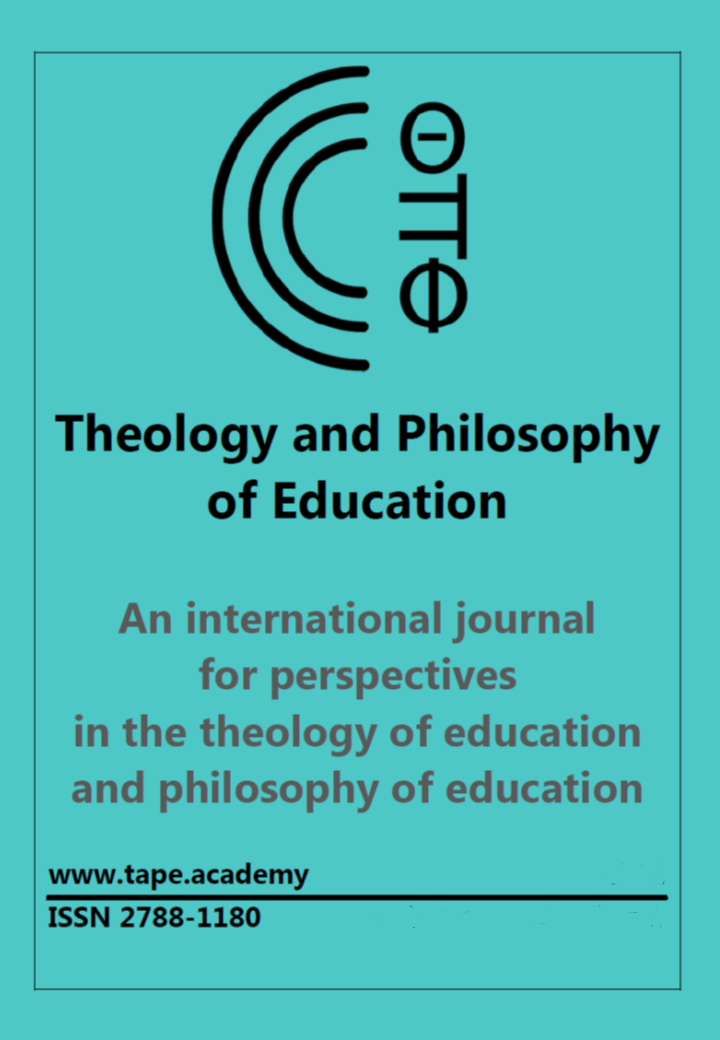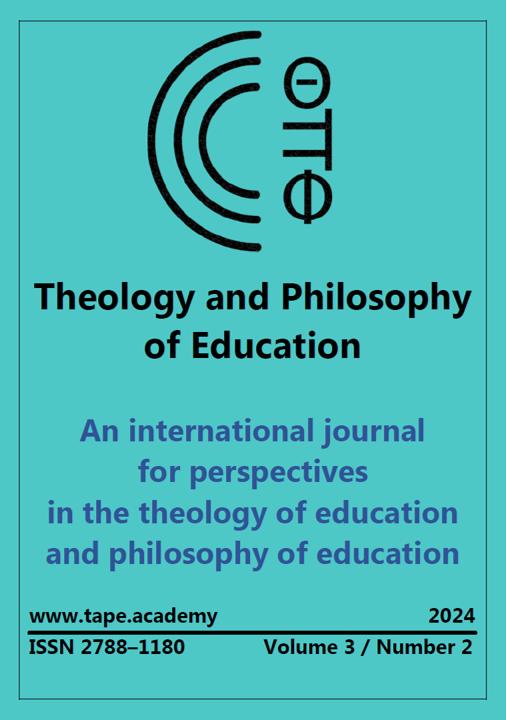Theology and Philosophy of Education
Theology and Philosophy of Education
Publishing House: Česká křesťanská akademie, z.s., Pedagogická sekce
Subject(s): Christian Theology and Religion, Philosophy, Education, Psychology, Theology and Religion, Religion and science , School education, Adult Education, History of Education, Educational Psychology, Developmental Psychology, Personality Psychology, Sociology of Culture, Sociology of the arts, business, education, Systematic Theology, Pastoral Theology, Sociology of Education, Sociology of Religion, Philosophy of Education, Pedagogy, Psychology of Religion
Frequency: irregular and other
Online-ISSN: 2788-1180
Status: Active
- 2022
- 2023
- 2024
- Issue No. 1/1
- Issue No. 2/1
- Issue No. 1/2
- Issue No. 2/2
- Issue No. 1/3
- Issue No. 2/3
Articles list
Theology and Philosophy of Education or on the Meaning of Academy
Theology and Philosophy of Education or on the Meaning of Academy
(Theology and Philosophy of Education or on the Meaning of Academy)
- Publication: (2/3/2024)
- Author(s): Zuzana Svobodová
- Contributor(s):
- Language: English
- Subject(s): Philosophy, Social Sciences, Theology and Religion
- Issue: 2/3/2024
- Page Range: 1-4
- No. of Pages: 4
- Keywords: philosophy of education; phenomenology; Jan Patočka; Radim Palouš; Jaroslava Pešková; Comenius; Edmund Husserl; life in truth; academy; theology of education; homo educandus; care for the soul
- Summary/Abstract: The meaning of academy given in Athens in antiquity is connected with the aim of the journal Theology and Philosophy of Education. This text explains the journal's conceptual roots with methodological distinctions. Both the role of the phenomenological approach and key persons are mentioned.
Dedication to the Truth: Newman’s Philosophy and Theology of Education
Dedication to the Truth: Newman’s Philosophy and Theology of Education
(Dedication to the Truth: Newman’s Philosophy and Theology of Education)
- Publication: (2/3/2024)
- Author(s): Tim Quinlan
- Contributor(s):
- Language: English
- Subject(s): Christian Theology and Religion, Philosophy, History of Philosophy, Ethics / Practical Philosophy, Philosophy of Religion, Sociology of Education, Philosophy of Education
- Issue: 2/3/2024
- Page Range: 5-13
- No. of Pages: 9
- Keywords: head; heart; reason; faith; dialogue; complexity of human being; universal knowledge; truth; multidisciplinarity; philosophy of education
- Summary/Abstract: The main thesis of this article is that Newman’s philosophy of education can only be understood within his Christian vision of the nature and vocation of humankind. That vision included a deep appreciation for real dialogue and human encounter at the very heart of education as well as an equally profound understanding of the deep complexity and inter-relation of all areas of knowledge including that of theology among the many subjects taught at university. For Newman, education, like truth, must result in wisdom and positive action as well as more intellectual and theoretical advances. Real education informs the intellect as well as forming the moral heart of the person. We may learn all the knowledge available to us, but we must also be agents of that knowledge by acting morally for the wellbeing of our fellow human beings, that is, in Newman’s language, to be able to marry our doctrine (knowledge) with our devotion to action and prayer (spirituality).
Reflection, Action and the Double Transformation
Reflection, Action and the Double Transformation
(Reflection, Action and the Double Transformation)
- Publication: (2/3/2024)
- Author(s): Paul Lentern
- Contributor(s):
- Language: English
- Subject(s): Philosophy, Social Sciences, Social Philosophy, Politics and society, Adult Education, Socio-Economic Research, Sociology of Religion
- Issue: 2/3/2024
- Page Range: 14-20
- No. of Pages: 7
- Keywords: lay apostolate; Cardijn; Jocist; Young Christian Workers; Lay Ministry; double transformation; evangelisation; mission; See-Judge-Act
- Summary/Abstract: An examination of the ‘Jocist’ reflection/action method as a tried and tested means of effective social transformation as well as profound personal transformation for the individual. Widely recognised for its efficacy as a tool used among young workers and students, the reflection/action method is equally valuable in animating lay women and men, of all ages, in the much neglected work of the lay apostolate and the task of being a ‘leaven’ in the world (Lumen Gentium N31).
The Theme of Love in Religious Education Built on the Story of Psyche and Orual: An analysis of the didactic potential of the work of C. S. Lewis – Till We Have Faces
The Theme of Love in Religious Education Built on the Story of Psyche and Orual: An analysis of the didactic potential of the work of C. S. Lewis – Till We Have Faces
(The Theme of Love in Religious Education Built on the Story of Psyche and Orual: An analysis of the didactic potential of the work of C. S. Lewis – Till We Have Faces)
- Publication: (2/3/2024)
- Author(s): Lucia Bieliková
- Contributor(s):
- Language: English
- Subject(s): Philosophy, Social Sciences, Education, Studies of Literature, Ethics / Practical Philosophy, Theology and Religion, Comparative Study of Literature, Philosophy of Religion, Sociology of Culture
- Issue: 2/3/2024
- Page Range: 21-27
- No. of Pages: 7
- Keywords: christian love; Till We Have Faces; Psyche and Orual; Deus caritas est; religious education
- Summary/Abstract: The article presents a brief analysis of the well–known novel by C. S. Lewis Till We Have Faces with regard to its didactic potential in religious or ethical education. It focuses on the theme of love and the fundamental principles on which interpersonal relationships should be built from a Christian perspective. In the story of the mythological sisters Orual and Psyche, the author has depicted all the key ideas about the nature of love and its relationship to God that are also found in Deus caritas est, the encyclical on the love of God by Benedict XVI. The ambition of this article is to present these basic motivational story lines as a starting point for the possible use of this work in school teaching or catechesis.
Individuation and Movements of Existence in Jan Patočka: Horizon of Education
Individuation and Movements of Existence in Jan Patočka: Horizon of Education
(Individuation and Movements of Existence in Jan Patočka: Horizon of Education)
- Publication: (2/3/2024)
- Author(s): Lina Marcela Gil-Congote
- Contributor(s):
- Language: English
- Subject(s): Philosophy, History of Philosophy, Philosophy of Mind, Cultural Anthropology / Ethnology, Social Theory, Phenomenology, Philosophy of Education
- Issue: 2/3/2024
- Page Range: 28-34
- No. of Pages: 7
- Keywords: individuation; movement; care for the soul; existence; education (Bildung); educator; authenticity; inauthenticity
- Summary/Abstract: Jan Patočka addresses the concept of individuation in relation to the three movements of existence. This article argues that education functions as a process of individuation, requiring educators to engage with the third movement of existence in order to summon learners’ potential in their search for truth, autonomy and responsibility. The article is structured into three sections: Education in Patočka, Individuation and the movements of existence, and Pedagogical implications of the third movement, characterized by the open soul, as the horizon of education.
The Concept of Education of Paweł Smolikowski CR (1849–1926)
The Concept of Education of Paweł Smolikowski CR (1849–1926)
(The Concept of Education of Paweł Smolikowski CR (1849–1926))
- Publication: (2/3/2024)
- Author(s): Dominika Jagielska
- Contributor(s):
- Language: English
- Subject(s): Anthropology, Philosophy, Education, History of Philosophy, Ethics / Practical Philosophy, Theology and Religion, History of Education, Pedagogy
- Issue: 2/3/2024
- Page Range: 35-42
- No. of Pages: 8
- Keywords: Paweł Smolikowski; the Resurrectionists; the Resurrectionist system of education; education; Catholic education; Paweł Smolikowski’s concept of education
- Summary/Abstract: Paweł Smolikowski CR was a priest, missionary, doctor of theology, as well as a philosopher, historian and writer. A member of the Resurrectionist congregation, he is still regarded as one of the main representatives of Resurrectionist philosophical and pedagogical thought at the turn of the nineteenth and twentieth centuries. He left behind a rich legacy. His concept of education fits in with the Resurrectionist educational system that was introduced in many places in Europe. In this article, I would like to present the main elements of Paweł Smolikowski's concept of education with emphasis along with its anthropological foundations.
The Role of Teacher and Pupil in the Context of Autonomous Learning
The Role of Teacher and Pupil in the Context of Autonomous Learning
(The Role of Teacher and Pupil in the Context of Autonomous Learning)
- Publication: (2/3/2024)
- Author(s): Jana Kucharová
- Contributor(s):
- Language: English
- Subject(s): Philosophy, Social Sciences, Education, Theology and Religion, Educational Psychology, Developmental Psychology, Sociology of Education, Philosophy of Education, Pedagogy
- Issue: 2/3/2024
- Page Range: 43-51
- No. of Pages: 9
- Keywords: autonomous learning; autonomous pupil; active pupil; teacher; manager; organizer; advisor; education
- Summary/Abstract: The paper offers a brief overview of the role of teacher and pupil in the context of autonomous learning. An autonomous pupil means an active pupil. His activity consists not only in motivation to learn, but also in participating in social processes, defining one’s own goals and responsibly managing the way to achieve them. The teacher accompanies the active student through the learning process as a manager, mediator, advisor, but also as a fellow pupil. The aim of the paper is to specify the roles and characteristic features of the autonomous teacher and pupil and to point out their differences with respect to the traditional perception of the teacher and pupil in the process of upbringing and education.
Short Description
Theology and Philosophy of Education (TAPE) is an open-access journal for discussing different aspects of the theology of education and philosophy of education. TAPE should provide a platform on which there is a chance of sharing the perspectives concerning the topics and problems connected with philosophy, theology, education, and their respective interconnection and cooperation. It should contribute to opening further horizons of thought and spark discussion by encountering various ideas, both mutually interacting and mutually contending, thereby uncovering and elucidating possible ways and solutions of discussed phenomena. Thus, it is to be a place (ἀγορά) free for developing and discussing ideas. TAPE desires to contribute to shaping the dialogue between theology, philosophy, and approaches in education. Its quest is to help disseminate contributions that testify to the actual thinking of the education fundaments and thus participate in the development of such reasoning, perception of reality, and reflection of orientation, which could help teachers and educators in their mission.
All papers (articles) submitted to Theology and Philosophy of Education are subject to blind review by two reviewers. The journal actively checks for plagiarism in each submitted paper. In TAPE, each peer reviewer plays a vital and significant part in the peer-review process. All our reviewers must conduct peer reviews in an ethical and responsible manner recommended by Committee on Publication Ethics (COPE). All our editors respect COPE guidelines for the best publication ethics practice.
Editorial board
Editor-in-chief
Zuzana Svobodová, Czech Republic, Charles University, University of South Bohemia, ORCID, Web of Science ResearcherID, svobodova@tape.academy, zuzana.svobodova@lf3.cuni.cz
Editors
John Anthony Berry, Malta, University of Malta, ORCID, Web of Science ResearcherID, john.berry@um.edu.mt
Andrea Blaščíková, Slovakia, Constantine the Philosopher University in Nitra, ORCID, Web of Science ResearcherID, ablascikova@ukf.sk
Dariusz Stępkowski, Poland, Cardinal Stefan Wyszynski University in Warsaw, ORCID, Web of Science ResearcherID, d.stepkowski@uksw.edu.pl
Carl Mario Sultana, Malta, University of Malta, ORCID, Web of Science ResearcherID, carl.m.sultana@um.edu.mt


